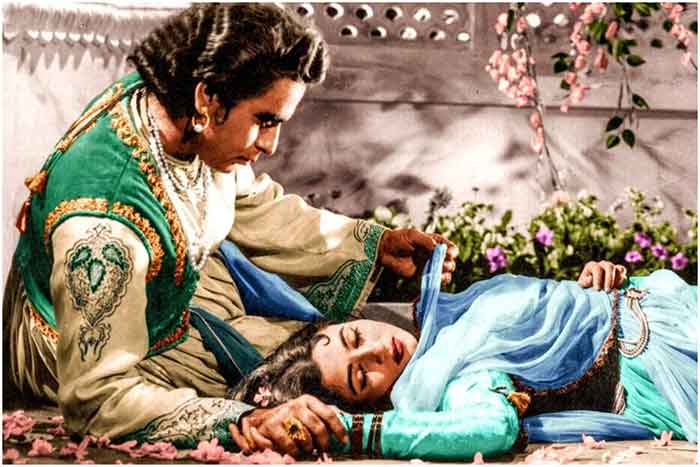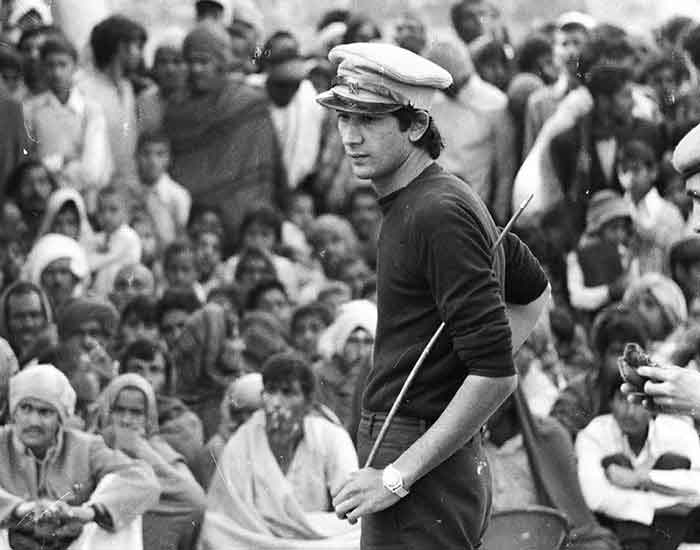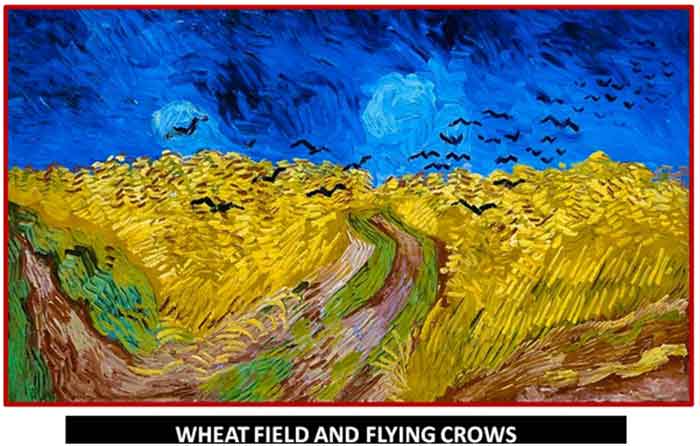by Bharat Dogra and Madhu Dogra

21 Most Memorable Songs of Immortal Love in Hindi Cinema
Love and romance being the eternal theme of Hindi films, it is not surprising that we have so many great love songs here, but by songs of immortal love we refer specifically to those songs which speak of love as a very deep lifelong commitment and sometimes even as a commitment which transcends life itself. Such songs frequently refer to love as something which goes beyond the give and take of everyday life. In these songs love goes much beyond sensual desire to often have a spiritual meaning. Frequently these songs also celebrate and eulogize the courage and glory of true love. With their great popularity, these songs also contribute at several levels to challenge the forces of social conservatism.
So let us start our journey of these songs with two which celebrate the courage of true love. The first of these is from Mughal-e-Azam—Zindabad, Zindabad, Eai Mohabbat Zindabad. The scene in this song depicts a situation in which due to his defiance of all in pursuit of his true love, death sentence to Prince Salim is about to be executed. A large number of soldiers and people are gathered. Everyone is sad and disturbed, but who can raise a voice of protest? Then suddenly a sculptor emerges with a song of protest which is even more a song which celebrates immortal love. M. Kumar as the brave sculptor and Dilip Kumar as the about to be executed yet fearless prince look great. Shakeel Sahib (Budayuni) has poured his heart out in his poetry here and only the great Naushad could have been able to provide matching music. What a great team! And just hear the voice of the one and only Mohammed Rafi as its pitch rises and rises to convey the most courageous parts of the poem.
Then in the context of celebrating true love, raising it to a high spiritual level, there is this gem of a qawwali from Barsaat Ki Raat (1960) film– Ye Hai Ishq Ishq Hai Ishq Ishq. With great music by Roshan and poetry by Sahir Ludhianvi, this is often mentioned as perhaps the greatest qawwali in Hindi cinema. Filmed on Bharat Bhushan, Madhubala, Shyama and others, this has been rendered very well by Rafi, the great Manna Dey, S.D. Batish , Sudha Malhotra and others, with the peak provided by Rafi Sahib in a way only he can—unforgettable. His best is reserved for the stanza which uplifts love to the realm of spirituality.
Can there be a better celebration of fearless love than that never-to-be-forgotten-dance number from Mughal-e-Azam—Pyar Kiya to Darna Kya. Madhubala’s dance is great as ever of course, but one can never forget are her expressions of defiance, her open declarations that her love is fearless —Parda nahin jab koi khuda se bando se parda karna kya! What a great lyric Shakeel has written and what an equally great musical score by the great Naushad. A most memorable song of Lata Mangeshkar from Mughal-e-Azam.
Now we come to our two personal favorites. There is this beautiful song from Jis Desh Mein Ganga Behti Hai sung by Lata Ji—O Basanti Pawan Pagal, Na Ja Re Na Ja. Raj Kapoor and Padmini are deeply in love but other circumstances intervene and he has to leave. As emotionally and physically injured Raj tries to negotiate a dangerous hilly path, Padmini cries out to him not to leave. Nothing moves his resolve to leave till this line from the song makes him look back—Yaad kar tune kaha tha pyar se sansar hai, ham jo haare dil ki baazi ye teri bhi haar hai. In other words, if even after a very true relationship, someone parts then it is a defeat not just of the one who is abandoned but also of the one who decides to leave, because ‘pyar se sansar hai’. Only Shailendra could have written this gem of a song, and only Shankar Jaikishan could have provided such great music.
Another favorite for us has been O re Majhi, O re Majhi, Mere Saajan Hai Us Paar song from Bandini. After very tragic events Nutan is now all set for a life of comforts, but suddenly she happens to meet again her first love, a revolutionary freedom fighter, now broken and seriously ill, perhaps terminally ill. How can she leave him? Nutan has only a few minutes to decide. And then a street singer starts singing this song. Simple words to convey such depth—only Shailendra could have written this, and then the one and only Sachin Dev Burman could have composed and sung this.
Pyasa, Gurudutt’s masterpiece, has an equally poignant moment when Waheeda yearns to reach out for her true love in a very emotional moment, and just then street ( folk) singers start singing a song of eternal, devotional love—aaj sajan mohe ang laga lo, janam safal ho jai, prem sudha itni barsa do jag sheetal ho jai. We have here combined feelings of earthly and sublime love. Geeta Dutt, the great singer with a voice uniquely her own, has done full justice to this truly great song.
Here we should also mention a song from Mamta film—Chupa lo dil mein pyar mera ke jaise mandir mein lo diye ki. Ashok Kumar departs from the home of his great love Suchitra Sen and as he travels in a very thoughtful mood this song sung by Hemant Kumar and Lata, written by Majrooh Sultanpuri and set to music by Roshan, plays in the background, creating a sublime feeling , a feeling of great serenity.
In the same film there is another song sung by Suchitra when Ashok Kumar is about to depart for a long period of absence. This song Rahe Na Rahe Hum, Mehka Karenge creates a similar feeling of great serenity, with its references also to after-life. This song occurs twice in the film.
Another such great song from film Taj Mahal, filmed on Pradeep Kumar and Beena Rai, is—Jo Wada Kiya Who Nibhana Parega. Great poetry by Sahir is accompanied by equally great music by Roshan.
A little known film Cha Cha Cha had unforgettable music by Iqbal Qureshi. Among its several great songs is this gem—Do badan pyar ki aag men jal gaye, ek chameli ke mandwe talle. This song, sung with great feeling by Rafi and Lata, filmed on Helen and Chandrashekhar, was written by Makhdum Mohiuddin. After hearing this great song there is an intense desire to know more about this poet.
In this compilation we must have at least one song in which responsibilities and challenges of the real world become a problem even in the path of most sincere love. Perhaps no other song can capture this situation better than this great song from Didi film—Tum agar bhool bhi jao to ye haq hai tumko, meri baat aur hai maine to muhabbat ki hai. Written as beautiful poetry by Sahir and sung soulfully by the one and only Mukesh and Sudha Malhotra, this duet has been composed by this great singer herself. This song also symbolizes the total surrender seen in immortal love—main tumhari hun yahi mere liye kya kum hai, tum mere ho ke raho ye meri kismet na sahi.
Some other gems that bring out various aspects of immortal love include– Hai isi mein pyar ki aabroo (film Anpadh, sung by Lata, written by Raja Mehdi Ali Khan with music by Madan Mohan), itna na mujhse tu pyar badhaa, ki main ik badal awara (film Chaya, sung by the one and only Talat Mehmud and Lata Ji, music by Salil Chowdhary, written by Rajendra Krishna), jalte hai jiske liye teri aankhon ke diye ( film Sujata, sung by Talat Mehmud, written by Majrooh and composed by S.D.Burman), Phoolon ke rang se ( film Prem Pujari, sung by the great Kishore Kumar, written by the famous poet Neeraj and composed by S.D), Beshak mandir-masjid toro ( film Bobby, sung by Narendra Chanchal, written by Inderjit Tulsi and composed by Laxmikant Pyarelal) Dil ek mandir hai, pyar ki jisme hoti hai pooja ( film Dil Ek Mandir, sung by Rafi and Suman Kalyanpur, composed by Shankar Jaikishan and written by Hasrat Jaipuri), , tere mere sapne ab ek rang hain( movie Guide, sung by Rafi, written by Shailendra and composed by S.D.), tum apna ranj-o-gam, apni pareshani mujhe de do (film Shagun, sung by Jagjit Kaur, written by Sahir and composed by Khayyam) , Mere nadeem mere humsafar udaas na ho ( film Bhai Behan, singer Sudha Malhotra, written by Sahir and composed by N.Datta), Dilruba maine tere pyar mein kya-kya na kiya ( film Dil Diya Dard Liya, sung by Rafi, composed by Naushad, written by Shakeel).
The writers work together on the subject of popular culture and songs.















































